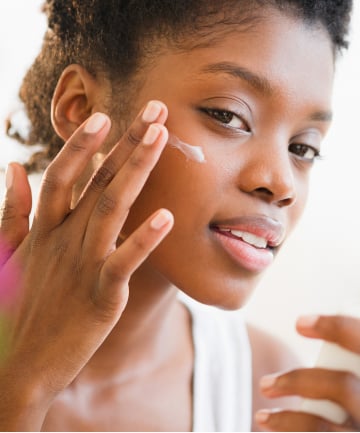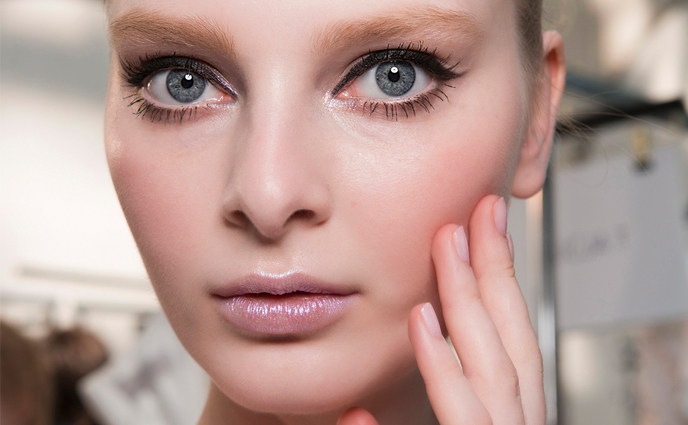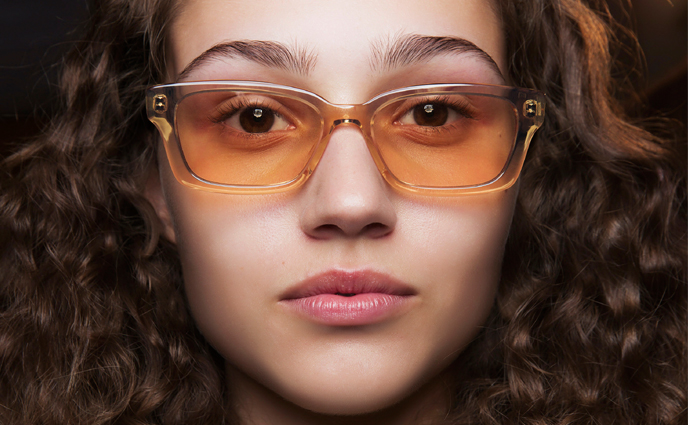The next time someone asks you, "What are the three things you'd bring with you to a deserted island?" your first response should be, "Sunscreen!" Good old SPF is a vital part of everyone's skin care regimen no matter what your skin color, whether you're a month old or in your 100s, and whether you live in the desert, on the beach, or in the rainiest part of the world.
Fortunately, we have access to the most elegant sunscreen formulations to date (or poor ancestors had to use things like mud and gunky pastes, even as recently as the early 1900s), which means... you've got zero excuses. To help reaffirm why sunscreen is more important than ever, we asked a few dermatologists to weigh in on the topic.
Image via Imaxtree
Fortunately, we have access to the most elegant sunscreen formulations to date (or poor ancestors had to use things like mud and gunky pastes, even as recently as the early 1900s), which means... you've got zero excuses. To help reaffirm why sunscreen is more important than ever, we asked a few dermatologists to weigh in on the topic.
Image via Imaxtree
"It is suggested that one in five Americans will have skin cancer at some point in their lives. In fact, UV rays cause more damage to the skin cells than cigarettes cause lung cancer," says Dr. Gretchen Frieling, a board-certified dermatopathologist based in the Boston area. "Being the most commonly diagnosed cancer in the U.S., looking after your skin is not something to take lightly. Everyone should include sunscreen as part of their skin care regimen."
Image via JGI/Jamie Grill/Getty
Image via JGI/Jamie Grill/Getty
Being laissez faire about sunscreen application doesn't do you any favors. Consistent application is important for your skin (and overall) health.
"Unfortunately, even one bad burn increases your chances of getting skin cancer. While the burns might fade away after a few days, the long-term damage [is done]," says Dr. Frieling. "A study conducted by the American Association for Cancer Research found that women who experienced at least five sunburns between the ages of 15 and 20 were 80 times more likely to develop skin cancer later on. Earlier exposure to sun damage is hazardous, which is why I reiterate — sun care is essential for all ages."
She adds that the more you go without sunscreen, the more your skin is at risk of. If you skip a few days of wearing sunscreen and you're getting direct exposure to the sun, you are repeatedly putting yourself at risk of skin cancer and premature aging.
Image via Imaxtree
"Unfortunately, even one bad burn increases your chances of getting skin cancer. While the burns might fade away after a few days, the long-term damage [is done]," says Dr. Frieling. "A study conducted by the American Association for Cancer Research found that women who experienced at least five sunburns between the ages of 15 and 20 were 80 times more likely to develop skin cancer later on. Earlier exposure to sun damage is hazardous, which is why I reiterate — sun care is essential for all ages."
She adds that the more you go without sunscreen, the more your skin is at risk of. If you skip a few days of wearing sunscreen and you're getting direct exposure to the sun, you are repeatedly putting yourself at risk of skin cancer and premature aging.
Image via Imaxtree
In addition to preventing the development of skin cancer, wearing sunscreen every day helps keep your skin looking youthful for longer. The sun's UVA rays are notorious for breaking down collagen and elastin, causing brown spots, thinning the skin, and expediting wrinkle formation. Sun-exposure also dehydrates the skin of natural oils, making it appear temporarily flaky and aged.
A broad-spectrum SPF 30+ sunscreen should be applied every morning to any exposed area of the skin, then reapplied every two hours if you're outdoors and every four hours in you're inside. Allocate a shot-glass worth of sunscreen to your body and a blueberry sized dollop for your face.
In addition, you want to make sure you're applying SPF before you're actually outside.
"It takes at least 10 minutes for the sunscreen to soak into the skin and provide adequate coverage that will match the listed SPF. If you are not protected during those 10 minutes, you can get a really quick burn in sunny zones," notes Dr. Ava Shamban, a board-certified dermatologist based in Beverly Hills. "Also, it's quite common to neglect areas that get sun exposure. For example, we often forget to apply to the back of the neck, our ears, décolletage, and back of the hands. Your sunscreen won't work if you're just applying it in a two-dimensional application process. Apply to every curve of your body to get the SPF listed on the bottle."
Image via Imaxtree
A broad-spectrum SPF 30+ sunscreen should be applied every morning to any exposed area of the skin, then reapplied every two hours if you're outdoors and every four hours in you're inside. Allocate a shot-glass worth of sunscreen to your body and a blueberry sized dollop for your face.
In addition, you want to make sure you're applying SPF before you're actually outside.
"It takes at least 10 minutes for the sunscreen to soak into the skin and provide adequate coverage that will match the listed SPF. If you are not protected during those 10 minutes, you can get a really quick burn in sunny zones," notes Dr. Ava Shamban, a board-certified dermatologist based in Beverly Hills. "Also, it's quite common to neglect areas that get sun exposure. For example, we often forget to apply to the back of the neck, our ears, décolletage, and back of the hands. Your sunscreen won't work if you're just applying it in a two-dimensional application process. Apply to every curve of your body to get the SPF listed on the bottle."
Image via Imaxtree
"As we speak, the ozone layer — which absorbs the most UV rays in the stratosphere — is depleting, meaning the Earth's natural protection is not enough anymore," says Dr. Frieling. "According to the CDC, skin cancer rates in the U.S. have doubled in the last 20 years, and it can be attributed to change in exposure risk factors. This includes indoor tanning and consistent unprotected overexposure to direct sunlight."
The moral of the story here is that sunscreen shouldn't be lumped into the "optional skincare" category. Consistent application is vital to our health and wellbeing. Though it may not offer instant gratification, over the years you'll thank yourself for being so diligent.
Image via Imaxtree
The moral of the story here is that sunscreen shouldn't be lumped into the "optional skincare" category. Consistent application is vital to our health and wellbeing. Though it may not offer instant gratification, over the years you'll thank yourself for being so diligent.
Image via Imaxtree









